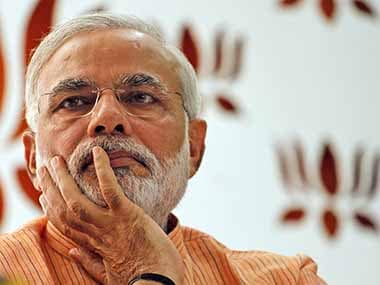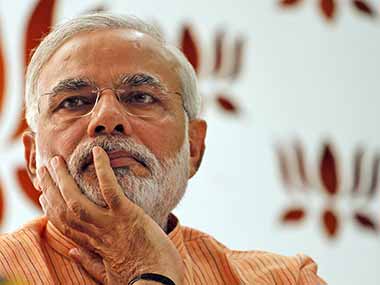BJP supporters and opponents of the Gandhi family are thrilled at the decline of the Congress party. They have strong reasons to be so. Our country still remains mired in poverty, most citizens lack basic needs, our economy still remains dependent on the monsoons and even after twenty-five years of liberalisation, a government job is considered more valuable than a job in the private sector. [caption id=“attachment_2643470” align=“alignleft” width=“380”]  File image of Prime Minister Narendra Modi. AP[/caption] Despite all this, the Gandhi family still controls the Congress party – there has been no major rebellion from within, the second rung of leadership just doesn’t exist, and there is no visible strategy or change in ideology even after the dreadful defeat in the 2014 Lok Sabha elections. In fact, as a political party, they have moved even farther to the left, and if such policies are implemented, it will be even more counter-productive for India. Modi's dream of a '_Congress-mukt Bharat'_ seems to be on track , but the truth is that a Congress-mukt Bharat will not itself result in a poverty-free India. For that to happen, BJP has to turn out to be vastly different from Congress , and there exists enough evidence to show that it would not. BJP, so far, has appeared to be a reluctant fearful change-agent, pandering to its different political constituencies rather than taking on the politically difficult challenges. But to be fair, the reality is that the Indian economy is in far greater shape than it was when Modi took control in 2014. It is doing remarkably well in comparison to other countries. India has become one of the top destinations for investment, inflation is down and to the government’s credit it has stuck to its fiscal goals. The passing of the Aadhar legislation was a massive moment in the transformation of subsidy delivery and the bankruptcy bill is another feather in BJP’s cap. The Parliament hasn’t functioned so smoothly in the last two decades as it did in the previous session. There is greater focus on roads, we will soon have bullet trains in the country, the banks are clearing up their balance sheets and disinvestment plans are being put into place. There is talk of monthly targets for ministries with proper monitoring and supervision. But undoubtedly, its biggest policy win has been the devolution of funds and greater legislative freedom to the states. With so much success in these two years, why is disillusionment and cynicism then setting in amongst Modi’s most fervent supporters? It’s because the change in governance hasn’t changed your and my life one bit. The cities we live in continue to be a mess, the number of interactions with the bureaucracy hasn’t reduced, taxmen continue to hound the honest, caste remains a big factor in government jobs and education while our primary education system is in the pits, policing remains abysmal, courts are getting clogged with cases, and India still is a very difficult place to do business in. Most importantly, the belief that the government, and not the markets, has to provide for employment, food, housing or education has not fundamentally changed. In a democracy as noisy as India, these are hard problems which cannot be solved within two years, and as a leader you might have to do the very things you inherently don’t believe in. But this is exactly what Modi was elected for: real change. The PM can defend the government by comparing its performance with that of the previous governments, and he does have a strong case, but the public gave him an once-in-a-lifetime mandate to bring about serious changes. Yes, a few laws have been repealed but we had imagined him to be our Reagan or Thatcher. Now, all that we hear from the PM is about farmers, agriculture, poverty and not markets, businesses and profit making. This isn’t substantially different from the Congress era and the campaign promise of “getting the government out of business” has long been forgotten. Maybe the Modi of 2016 needs to hear the speeches made by the Modi of 2014. There was a brief moment in 2014, when there was genuine belief that one may not have to move to the West for a more satisfying and enriching life. But that has now given way to realism and many understand that for this generation, the surest way to achieve success and wealth still lies in a one way ticket to the United States. And that is deeply depressing.
Current government isn’t substantially different from the Congress era and maybe the Modi of 2016 needs to hear the speeches made by the Modi of 2014.
Advertisement
End of Article


)
)
)
)
)
)
)
)
)



